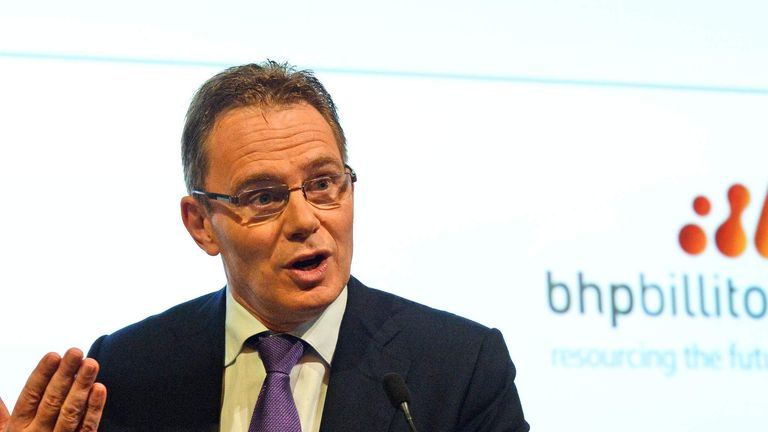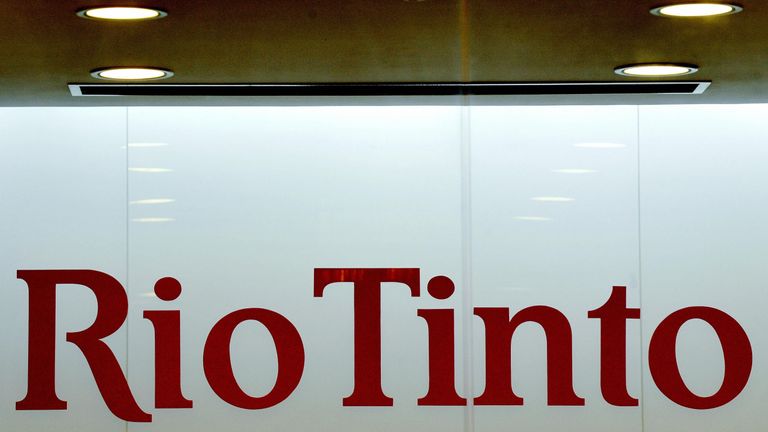Mining giant BHP to strengthen link between executive bonuses and emissions
The world's largest mining group said that from 2021 targets and pay will reinforce the importance of action to reduce emissions.
Tuesday 17 September 2019 22:09, UK
It's not unusual to hear a big company say how committed it is to tackling climate change and reducing its CO2 emissions.
Wary of being accused of 'greenwashing', many now go out of their way to highlight what they are doing on this front, producing evidence that deeds are matching words.
Fewer, though, go so far as to link the boss's pay to their efforts to tackle climate change.
BHP, the world's biggest mining company, was already doing this to a limited extent.
Today, however, it announced it would go further.
In its annual report, it told shareholders: "Climate change is a global challenge that requires collaboration.
"Resources companies such as BHP, our customers and governments must play their part to meet this challenge.
"Responding to climate change remains a priority governance and strategic issue for us.
"Management has primary responsibility for the design and implementation of our climate change strategy and our performance against our targets is reflected in senior executive and leadership remuneration.
"From 2021, the link between our targets and management remuneration will be strengthened to reinforce the strategic importance of action to reduce emissions."
In other words, a greater proportion of the bonuses of senior executives - including Andrew Mackenzie, the chief executive - will be linked to hitting climate change targets.
Executives will, in effect, increasingly be putting their money where the company's mouth is.
The move confirms BHP, whose shares are listed on the London, Sydney, New York and Johannesburg stock exchanges, as a pace-setter in its field.
The company put noses out of joint when, in April last year, it quit the World Coal Association, the industry lobby group, citing "discrepancies [on climate change] versus their position and our own".
It did so again when, in July this year, Mr Mackenzie said BHP would become the first mining company to seek not only to cut its own greenhouse gas emissions but also those caused by customers using its resources - so-called 'Scope 3' emissions - as opposed to just 'Scope 1' emissions (powering its mines) and 'Scope 2' emissions (operating them).
This is something that other mining companies have been wary of doing, partly because there is a danger of double-counting across industry as a whole, with their 'Scope 3' emissions also being counted by some customers as their own 'Scope 1' emissions.
In today's annual report, which follows last month's news of a 2% rise in full year profits on an underlying basis to £7.49bn, BHP set out just how much it has its work cut out.
Its most significant 'Scope 3' emissions came from the processing and use of its products, particularly via its iron ore and metallurgical coal to make steel, with converting its copper into wire also contributing.
It said emissions from such use came to 305m tonnes of CO2 - down from 323m tonnes last year and 314m tonnes two years ago.
The scale of its challenge is laid bare by the fact that the steelmakers using BHP's iron ore and coal create 130 times the emissions that BHP does in extracting such resources.
Getting customers like Chinese steel producers to cut such emissions will be hard.
The Australian newspaper described it today as "A Herculean Green Task".
To that end, BHP announced in July that it has launched a new climate investment programme to invest in technologies to cut emissions and to carry out related research in the field, including carbon capture and storage.
It will invest up to $400m during the five years from 2020 in the process with the specific aim of cutting its 'Scope 3' emissions.
Nor will some moves towards decarbonisation necessarily make BHP's job easier.
Mr Mackenzie recently pointed out in an article for the Financial Times that, while electrification of cars might reduce greenhouse gas emissions, electric motors require 80% more copper than an internal combustion engine.
But no-one can accuse the company of not being ambitious.
The question is whether other resources companies - oil and gas producers as well as miners - will adopt a similar strategy.
Rio Tinto, BHP's largest competitor, has to date set its face against setting targets for reducing 'Scope 3' emissions.
This is hardly surprising, given that its 'Scope 3' are significantly higher than those of BHP, while its customer base is even more heavily skewed towards Chinese steel producers.
Rio will also have noted last week's comments from Scott Morrison, the new Australian prime minister, in which he said big businesses should concentrate more on raising the living standards of their employees and less on "distractions" such as dealing with activists.
Yet the industry may, in time, be forced to do more.
Rio faced a motion at its annual meeting this year from an arm of Friends of the Earth demanding that it set targets to reduce its own 'Scope 3' emissions.
The motion was overwhelmingly voted down by Rio's shareholders.
Increasingly, though, investors - such as Norway's vast sovereign wealth fund - are pressing companies to make more progress in this field.
BHP may be the first of the big global mining companies to set such targets - but it will surely not be the last.






